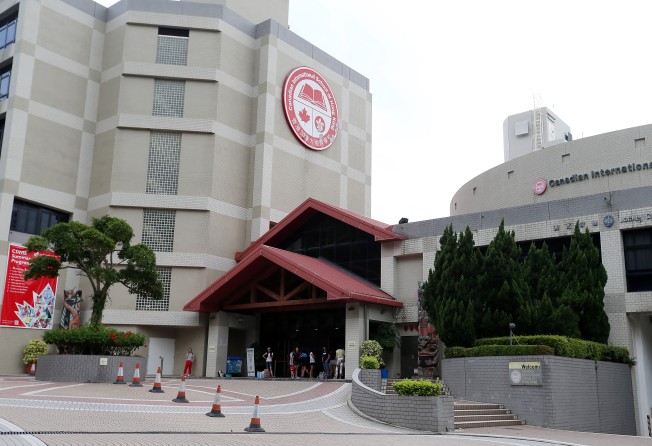Coronavirus: Hong Kong government allows face-to-face teaching in international schools despite citywide suspension of classes
- Some students at international schools have been asked to return to campus for tutorials, a move approved by Education Bureau
- Teachers’ union warns of dangers of creating a loophole amid the outbreak

Hong Kong’s education authorities have allowed teachers at international schools to meet with students on campus to help them with coursework despite the citywide closure of schools until at least March 16 to contain the spread of the coronavirus, the Post has learned.
Sources have revealed that some international schools running the International Baccalaureate (IB) curriculum had asked students to return for tutorials or assessments. The Education Bureau said it had approved the practice.
The move has triggered a warning from a teachers’ union about creating a loophole that could increase the risk of infection.
The government announced on Thursday that all classes at Hong Kong kindergartens, primary and secondary schools had been suspended for a further two weeks until March 16 because of the coronavirus outbreak, which has infected 56 people across the city.
Schools were also advised to cancel group and extracurricular activities on campus as an anti-contagion measure.
An email from Jane Camblin, head of school at the 1,800-pupil Canadian International School of Hong Kong (CDNIS) in Aberdeen, told staff that from March 2 they would be “required to be present daily on campus … ready to teach Grade 12 in person”.
A source said about 100 of CDNIS’ Grade 12 students due to take the IB exam this year were asked to attend face-to-face coursework sessions from March 2.
The IB programme, which spans two years, provides an internationally accredited diploma for entrance into higher education institutions.
Other CDNIS staff teaching junior classes were asked to return to campus each Monday from March 2 to deliver online coursework and attend faculty meetings, while working from home the rest of the week.
Students who did not feel comfortable attending in person could maintain contact with teachers online instead, the source added.
The wearing of masks on-site was optional and the school would not provide them, but temperature screening would be in place, Camblin added.
But in a letter sent to international school heads, the Education Bureau specified that if schools were to arrange for students to be back on campus, they should all be required to wear surgical masks.
A parent of a Grade 12 student at CDNIS, who wished to remain anonymous, said she would assess how the outbreak developed before deciding whether to let her child back on campus.
Another parent felt it was unsafe to let his child back into school but said they were given little choice over the matter.
He said some oral exams at CDNIS were scheduled to take place in the second week of March.
“Teachers have also told students that this is mandatory,” he said. “They do not give parents a choice and are unwilling to change their exam dates.”
A second source told the Post that small groups of students at other international schools running the IB curriculum had been recalled as early as this week for face-to-face tutorials or assessments.
The source said that school-based assessments – such as the oral element of language subjects – were a compulsory part of the IB exam and could not be performed online.
When asked about the potential health risks associated with students returning to campus, CDNIS said it followed EDB guidelines.
“Our community’s health, safety, and well-being, along with our students’ education continue to be CDNIS’ top priorities,” a spokeswoman said.
English Schools Foundation (ESF), which runs five secondary international schools in Hong Kong, said that Year 11 and 13 pupils who were required to complete time-sensitive internal assessments in areas such as the visual arts, music or languages might return to campus before March 16, with group sizes kept to a minimum.
The IB organisation said earlier this month it had offered an extension to schools struggling to meet deadlines.
Some international schools have still not finished their courses because their exams are held after the local university entrance exam, the Diploma of Secondary Education (DSE).
Most local students sitting the DSE have finished classes with exams to be held in March, unless contingency plans to postpone them for a month are implemented.
The Education Bureau said it had allowed international schools to arrange face-to-face sessions on campus for some students.
“The bureau understands there are strong urges from these schools, students who need to take part in upcoming exams and their parents, therefore contingency plans have been implemented,” a bureau spokeswoman said.
Schools should however give parents a choice whether to let their children go back on campus, she added.
Fung Wai-wah, president of the Professional Teachers’ Union, which represents about 85 per cent of the city’s educators, expressed concern over the risk of infection and of creating different sets of rules for international and local schools.
“Even if students return to campus in small groups, there are still infection risks of the [coronavirus] as social contacts should be avoided,” said Fung. “I believe it is important to rethink carefully whether these arrangements are really necessary.”
Ruth Benny, founder and head of education consultancy Top Schools, believed the flexible arrangements for international schools were fair given the exam timetable was controlled overseas.
She said the bureau could postpone the DSE for local schools but the situation was not as simple for international ones.
“The Education Bureau, if they want to shift the whole [DSE] schedule back, that’s entirely under their control. But these [international] exams, they’re not under the control of the Hong Kong government,” she said.